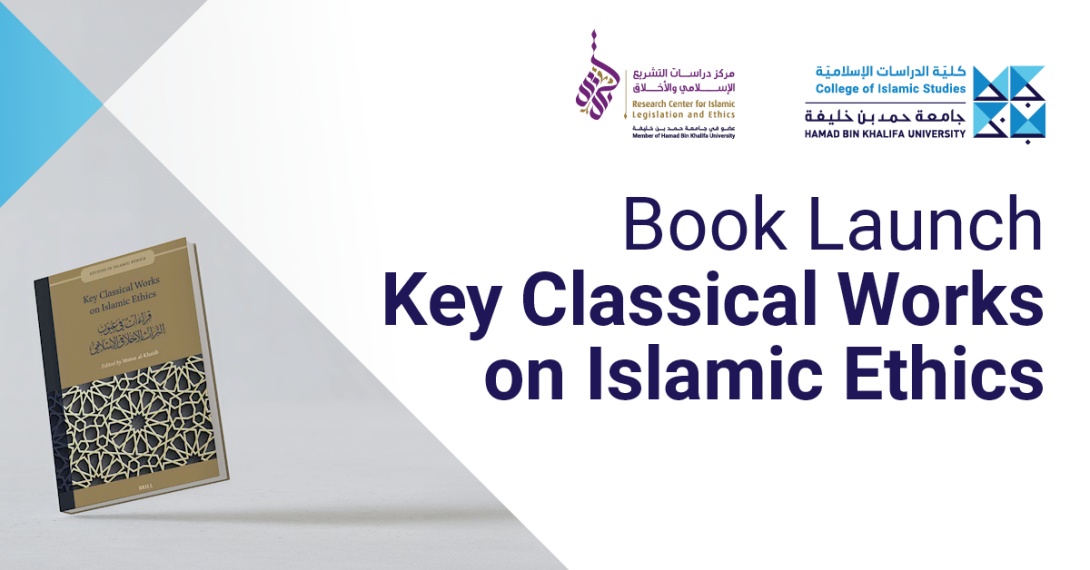As part of its ongoing efforts in advancing interdisciplinary research on Islamic ethics, the Research Center for Islamic Legislation and Ethics (CILE) hosted a seminar to celebrate the launch of the 7th volume of the Studies in Islamic Ethics book series titled "Key Classical Works on Islamic Ethics", published in collaboration with Brill. The volume, part of an ongoing series, stems from the 8th International Conference co-organized by CILE and Leuven University. The event brought together faculty and contributors for in-depth discussions about the volume’s role in rethinking the historiography of Islamic ethical thought.
Overview of the Volume
Comprising 13 chapters, the volume showcases a wide array of scholarly contributions—from philosophical and theological analyses to studies on Sufism, law, and ethics—authored by leading figures such as Matthew Anderson, Ovamir Anjum, Raja Bahlul, Hans Daiber, Omar Farahat, Mohammed Ghaly, Paul Heck, Mutaz al-Khatib, Taneli Kukkonen, Chafika Ouail, Arjan Post, and Jason Welle, each exploring key classical texts and figures within Islamic ethical traditions. While existing studies have examined certain classical sources, many remain under-explored or have been treated in limited and problematic ways. This volume offers a representative sample that highlights the diversity of ethical reasoning in the Islamic tradition—demonstrating that its practical rationality extends well beyond the confines of Greek philosophical frameworks and correcting longstanding misconceptions in the field.
Dr. Mutaz Al-Khatib, Associate Professor, CILE Program Coordinator of MA in Applied Islamic Ethics, College of Islamic Studies (CIS), Hamad Bin Khalifa University (HBKU) and editor of the volume, opened the seminar by describing the book as a significant contribution to the field of Islamic ethics. He emphasized that it moves beyond the narrow confines of the Greek philosophical ethics, instead presenting Islamic ethics as an inherently interdisciplinary field. He explained that the volume draws from diverse Islamic disciplines—including Qurʾān, ḥadīth, sīra (biography of the Prophet), theology (kalām), jurisprudence (fiqh), Sufism, and philosophy—highlighting both theoretical and practical dimensions of ethics. Covering sources from the 3rd/9th to the 8th/14th century, the book underscores the richness and plurality of ethical perspectives in the Islamic tradition, and challenges the widespread assumption that Islamic civilization lacks ethical depth or diversity.
Dr. Mutaz outlined three key contributions of the book:
1. Broadening the concept of ethics: The volume integrates virtue ethics, deontological reasoning, and practical rationality, challenging the narrow philosophical definitions inherited from Greek thought.
2. Affirming the diversity of ethical thought: It demonstrates the plurality of ethical approaches within Islam, from narrative and legal sources to spiritual and theological ones.
3. Correcting Misconceptions: By demonstrating the abundance of Islamic ethical sources across genres, the volume refutes outdated claims about their scarcity.
Dr. Mohammed Ghaly, CILE’s Head and Professor of Islam and Biomedical Ethics at CIS, HBKU, presented his contribution to the volume—Chapter 3, Adab al-Ṭabīb by Isḥāq b. ʿAlī al-Ruhāwī. He explained how al-Ruhāwī, drawing from Greek medical and philosophical traditions, integrated religion, ethics, and science into a cohesive framework. Far from being outdated, the text shows how medical practice was historically rooted in divine accountability and moral responsibility. Dr. Ghaly contrasted this with modern secular bioethics, arguing that al-Ruhāwī’s spiritually grounded approach remains highly relevant—especially as fields like psychology increasingly reconsider the role of spirituality in ethical practice.
Dr. Arjan Post, Professor in Arabic and Islamic Studies at the University of Leuven, also discussed his contribution — Chapter 12: "al-Tuḥfa al-ʿIrāqiyya” by Ibn Taymiyya, a profound exploration of Sufi ethics. His analysis challenged narrow readings of Ibn Taymiyya as merely a legalist by showcasing how the scholar integrated divine law (ilāhiyya) with deeper metaphysical devotion (rubūbiyya). This balanced view, according to Dr. Post, reveals Ibn Taymiyya’s commitment to spiritual excellence grounded in both Sharia and inward surrender to divine wisdom. As Dr. Post noted, 'Besides the issue of law—you could say the legislative side of ethics—there is also the ontological side... this distinction, which is very well known in what today is starting to be called Taymiyyan studies... is crucial for understanding Ibn Taymiyyah.’
Adding an external perspective, Dr. Amr Osman, Professor of History at Qatar University, praised the volume’s expansive view of Islamic ethics but encouraged deeper engagement with the Greek philosophical tradition that shaped much of classical Islamic moral discourse. His reflections prompted thoughtful dialogue on how Islamic ethics have evolved through—and beyond—those intellectual roots.
The seminar offered rich insights into the evolving field of Islamic ethics, with a focus on how classical scholarship can inform contemporary moral discourse. A key theme was the integration of interdisciplinary (within Islamic sciences) and transdisciplinary (across broader academic fields) approaches. Dr. Al-Khatib noted that CILE’s work intentionally bridges these realms—bringing together theology, law, philosophy, and even medicine to address today’s complex ethical challenges.
Lastly, as noted during the seminar, the breadth of Islamic ethical sources makes it difficult to encompass them all in a single volume. Plans are therefore underway for future projects, including a potential 8th volume and the compilation of an annotated bibliography of Islamic ethical sources—drawing on hundreds of entries collected over the years by Dr. Mutaz. These initiatives aim to further deepen and expand the horizons of research in Islamic ethics.

